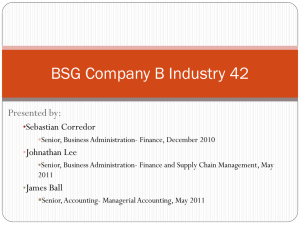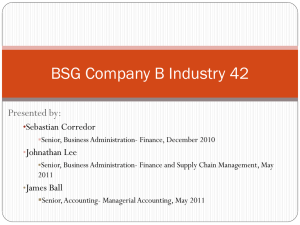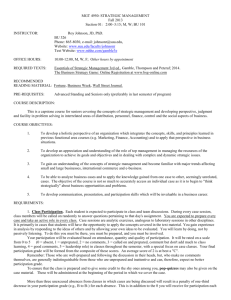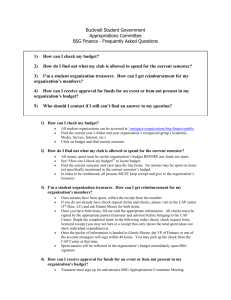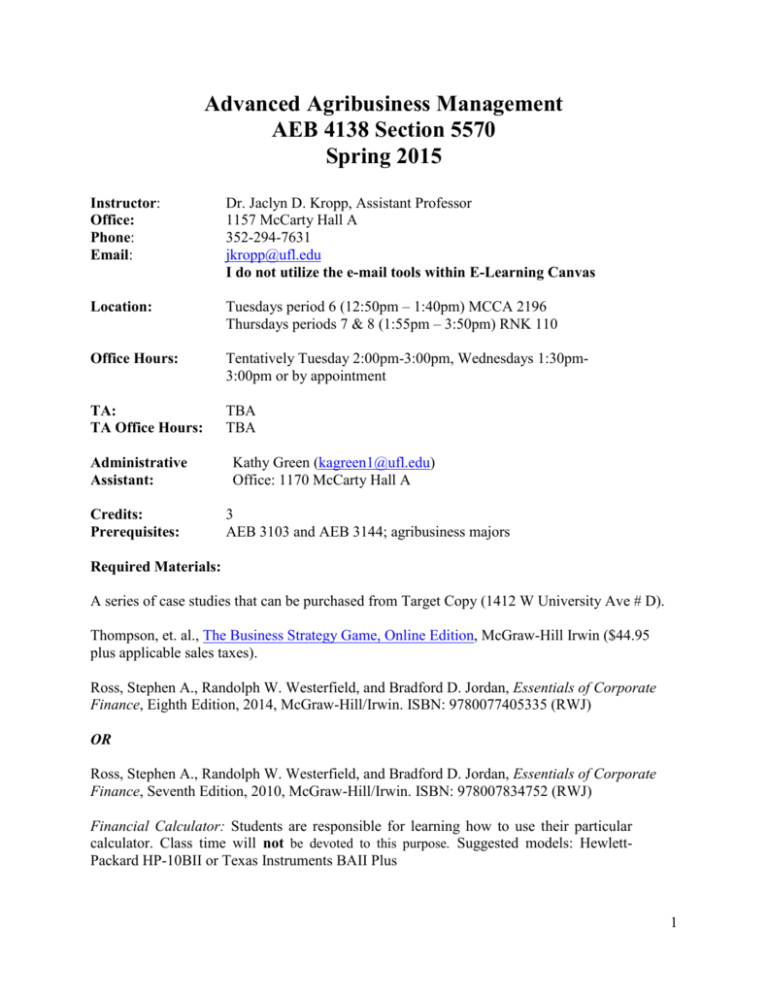
Advanced Agribusiness Management
AEB 4138 Section 5570
Spring 2015
Instructor:
Office:
Phone:
Email:
Dr. Jaclyn D. Kropp, Assistant Professor
1157 McCarty Hall A
352-294-7631
jkropp@ufl.edu
I do not utilize the e-mail tools within E-Learning Canvas
Location:
Tuesdays period 6 (12:50pm – 1:40pm) MCCA 2196
Thursdays periods 7 & 8 (1:55pm – 3:50pm) RNK 110
Office Hours:
Tentatively Tuesday 2:00pm-3:00pm, Wednesdays 1:30pm3:00pm or by appointment
TA:
TA Office Hours:
TBA
TBA
Administrative
Assistant:
Credits:
Prerequisites:
Kathy Green (kagreen1@ufl.edu)
Office: 1170 McCarty Hall A
3
AEB 3103 and AEB 3144; agribusiness majors
Required Materials:
A series of case studies that can be purchased from Target Copy (1412 W University Ave # D).
Thompson, et. al., The Business Strategy Game, Online Edition, McGraw-Hill Irwin ($44.95
plus applicable sales taxes).
Ross, Stephen A., Randolph W. Westerfield, and Bradford D. Jordan, Essentials of Corporate
Finance, Eighth Edition, 2014, McGraw-Hill/Irwin. ISBN: 9780077405335 (RWJ)
OR
Ross, Stephen A., Randolph W. Westerfield, and Bradford D. Jordan, Essentials of Corporate
Finance, Seventh Edition, 2010, McGraw-Hill/Irwin. ISBN: 978007834752 (RWJ)
Financial Calculator: Students are responsible for learning how to use their particular
calculator. Class time will not be devoted to this purpose. Suggested models: HewlettPackard HP-10BII or Texas Instruments BAII Plus
1
Other Useful Texts:
Holden, C., Excel Modeling In Corporate Finance, Fourth Edition, Pearson Prentice
Hall. ISBN: 0132497840.
Barry, Ellinger, Hopkin, and Baker, Financial Management in Agriculture, sixth edition,
Interstate Publishers, Inc., Danville, IL, 2000.
Subramanyam, K. R. and J. J. Wild. 2009. Financial Statement Analysis, tenth edition, McGrawHill Irwin. ISBN-13: 9780073379432.
The Economist and The Wall Street Journal
E-Learning Canvas:
There is a E-learning Canvas web-page for this course. To access the website, you will need
your Gatorlink username and password. E-learning Canvas can be accessed via
https://lss.at.ufl.edu/. If you are having difficulties accessing the website, please contact the UF
Computing Help Desk directly by calling (352) 392-HELP or via e-mail helpdesk@ufl.edu. You
will need your UFID when contacting them.
Course Description:
Integration of finance and management to solve problems faced by agricultural firms and
agribusinesses. In addition to lectures, students will work in small groups to identify and
to analyze case studies from agricultural and rural businesses.
Structure of the course:
This is an advanced undergraduate course that utilizes the skills acquired in previous
courses. This course is intended to reinforce and strengthen students’ knowledge of
management and financial concepts. Through a simulation and case studies, students will
analyze decision making from the perspective of senior-level management. The course is
designed to improve students’ critical thinking skills, enhance their written and verbal
communication skills, and advance their teamwork skills.
The class is designed such that classroom participation (not only attendance but also
active participation) and preparation outside the classroom are necessary for learning and
performing well in the course. Lectures will cover the major points of selected chapters.
However, unless told otherwise, students are required to read and understand the entire
chapters. It is expected that students will read all materials thoroughly.
Course objectives:
The course is designed to provide students with the fundamentals of finance and its
applications in agriculture and agribusiness. Consequently, we shall cover a broad range
of finance topics and applications.
2
The objectives of the class may be summarized as follows:
1) Highlight the importance of finance in real-world decision-making and the
uniqueness of finance related to agricultural and agribusiness firms.
2) Employ fundamental concepts and techniques that are at the heart of financial
decision-making. We shall cover various topics including the time value of
money, financial statement analysis, capital budgeting and structure,
investment decisions, credit, banking, agricultural lending, risk management
and financial markets.
After completing this course, students will be able to:
1) Suggest improvements for liquidity, solvency, profitability, turnover, and
market-to-book ratios using food and agricultural firms’ financial
statements;
2) Use the factors that influence optimal capital structure to determine the
optimal debt and equity levels for a food or agricultural firm;
3) Create pro forma financial statements to assess food and agricultural
investment opportunities using NPV, IRR, and sensitivity and scenario
analyses;
4) Determine the equity value of a food or agricultural firm using the
discounted future earnings model;
5) Calculate the cost of capital for a food or agricultural firm and interpret its
implications for evaluating operating and financial risk
6) Develop written documents that effectively and persuasively communicate
a stance regarding a food or agricultural business decision;
7) Work in teams to create an effective oral and written presentation for
communicating a suggested strategy or decision for a food or agricultural
firm.
Attendance Policy:
I accept students to attend all classes. Regular and punctual attendance at all classes is the
responsibility of each student. In the event of an absence, it is the responsibility of the
student to make up any resulting deficiencies.
I will inform the class in advance if I will not attend a particular class, in which case
arrangements will be made for a substitute instructor or other alternatives. However, in
case of an absence for which no advance arrangements have been made, students are
authorized to leave after a 10-minute wait.
3
Grading:
Assignment
Class Participation
BSG Decision 1 Justification
BSG Weekly Decision Worksheets
BSG Shareholders’ Letter
BSG Group Presentations (2 @ 10% each)
Peer Evaluation
Case Study Group Presentation
Case Study Individual Write-ups (2 @ 10% each)
Total
Weight
10%
7.5%
15%
10%
20%
7.5%
10%
20%
100%
In general, late assignments will NOT be accepted. The instructor reserves the right
to determine if a student shall be permitted to submit an assignment late (see
excused absences and late assignment policy below).
Re-grades:
If you feel that an error has been made in the grading of an assignment you are
encouraged to submit the assignment for a re-grade. Please note that the entire
assignment will be reviewed for accuracy.
Re-grade requests must be submitted no more than one week after the assignment in question
was returned to you. Please put the assignment in an envelope along with a typed explanation of
the issue in question.
Final Grades:
Final grades will not be posted on the course website. Students may obtain their final course
grade once grades have been posted by the University Registrar. I will not respond to emails or
other inquiries regarding grades between the final presentations and when final grades are posted
by the registrar.
Grades and Grade Points:
For information on current UF policies for assigning grade points, see
https://catalog.ufl.edu/ugrad/current/regulations/info/grades.aspx
4
Final grades:
Grade
A
AB+
B
BC+
C
CD+
D
DE
Range
95 - 100
90 - 94.99
87 - 89.99
83 - 86.99
80 - 82.99
77 - 79.99
73 - 76.99
70 - 72.99
67 - 69.99
63 - 66.99
60 - 62.99
0 - 59.99
If necessary, a curve may be added when calculating final grades. In past semesters, the curve
has been approximately 1 - 3 points. The curve will be determined based on current semester’s
students’ performance; therefore the curve may be higher or lower than the curve for previous
semesters.
Class Participation:
Part of your participation grade is based on attendance. At the beginning of each class you will
be asked to answer a short question/quiz regarding the previous class. However, the majority of
your participation grade will be based on active class participation. I expect you to actively
participate in class discussions. Contributing to conversations in other classes and on the job is a
critical skill.
You can take steps to improve your participation. If you tend to be a non-participant, I encourage
you to prepare questions or jot down a few key points before class and make an effort to speak
up in class. If you tend to 'dominate' discussions, learn to let other people contribute.
The single most important factor impacting your participation grade is the questions you ask
when other teams present case studies. This should be very easy because you will have already
analyzed the case study. Any differences in the teams’ results and yours are obvious bases for
questions. Furthermore, you cannot participate in course discussions if you have not completed
the case study.
5
Text Messaging, Instant Messaging, Facebook, Smokeless Tobacco, Etc.
Students caught engaging in these activities during class will receive a one percentage
point penalty on their final class participation grade for each offense. This policy will be
strictly enforced.
Excused absences and late assignment policy:
In order to be excused from class or allowed to submit an assignment late, you must
notify me in advance and secure my permission. The only acceptable reasons to request
an excuse are:
· Medical emergency (ordinary doctor's visit is not acceptable; proper documentation
justifying the excuse will be required).
· Significant personal or professional commitment (e.g., field trip for another course;
military duty; religious holidays; participation in official university activities such
as music performances, athletic competition or debate; court-imposed legal
obligations). Eligibility depends on instructor's judgment, and hence prior
permission is a must. Students will not be excused from group presentations for
such activities.
· Genuine family emergency (again, proper documentation/verification from
parent/guardian will be needed).
Documentation must be submitted no later than the first day you return to class.
Should you experience a significant hardship/illness (e.g. diagnosis of a terminal/chronic disease
of you or a close family member; e.g., depression; Crohn’s disease, cancer, etc.) during the
semester that negatively affects your performance in the course or has the potential to negatively
affect your performance in the course, you must inform me as soon as possible such that we can
make the appropriate accommodations.
Business Simulation Game:
The Business Strategy Game is a simulation game in which students (in teams of four or five)
will act as the management team responsible for the financial performance of an athletic-shoe
company. Teams will determine and implement a strategic plan for 7 years (7 decision rounds
plus two practice rounds). Early and continuing attention, focus, and commitment are strongly
correlated with success. Guidelines and expectations for the BOD presentations will be posted
on the class website. Every student must register on-line and pay the registration fee.
Students will be asked to assess their team members. However, please remember that those who
are guilty of allowing free riding are just as guilty as the free riders of poor team functioning. I
am willing to help resolve free-riding problems if they are brought to my attention.
Policy for Firing Group Members:
In extreme circumstances, and only have other corrective measures have failed, groups may fire
an underperforming group members if there is unanimous agreement to do so from the other
group members. Firing a group member requires prior consultation with the instructor.
6
BSG Decision 1 Justification and Shareholders’ Letter:
In order to ensure that you are applying finance concepts to evaluate your decisions, you will
work together as a team to submit two documents justifying your teams strategic decisions (e.g.,
building new capacity, investing in plant upgrades, employee compensation decisions,
advertising decisions, etc). Your team will submit a written memo and spreadsheets detailing
your decisions on two occasions. Using NPV and IRR will be important components of any
written justification.
BSG Board of Directors Presentations:
Each team will present its strategic business plan to the Board of Directors (Dr. Kropp and
potentially other FRE faculty) after three decision rounds. Another presentation will be made to
the BOD at the end of the semester as a final report on the firm’s performance. Progress reports
and evaluations may be requested. Board of Directors meetings will be scheduled such that all
group members can be present. A sign-up sheet will be circulated for specific dates and times.
BSG Weekly Decision Worksheets:
Each group member must submit a weekly decision worksheet every time BSG decisions are
due. The weekly decision worksheet will be designed such to incorporate recently learned
concepts in an effort to give students practice with the course material. These worksheets will
also assist in the preparation of the BOD presentations and written assignments related to the
game.
Peer Evaluations:
Each student will be asked to complete a set of peer evaluations (one for each team member) at
two points during the semester (following the BOD meetings). Per evalulations can be found online within the BSG website. Peer evaluation grades will be determined by their peers’
assessment of their performance, attendance at group meetings, contributions and efforts.
Students failing to submit peer evaluations for other group members while received a peer
evaluation grade of zero.
Case Study Group Presentation:
The course will use a series of case studies that pose issues and problems that have actually
arisen in businesses. Students are required to read, analyze, and suggest a course of action for
each case study. For one case study you will work in your simulation teams to develop a solution
and present a persuasive case for your suggested course of action. Teams can choose the case
study of their choice for presentation. Choosing case studies is on a first-come, first served basis.
Guidelines and expectations for the case study presentations will be posted on the class
website.
7
Individual Case Study Write-ups:
For the remaining two case studies you will work on your own to present a written document that
demonstrates your ability to analyze, synthesize, and suggest a course of action for food or
agricultural firm. The assignments are an opportunity for you to demonstrate that you can
competently apply the concepts that you have learned in your undergraduate program.
Guidelines and expectations for the case study write-ups will be posted on the class website.
Students certainly benefit from having a dialogue with their peers regarding the case studies.
These discussions typically enrich the learning process for students. This may result in very
similar content among students; this is okay. You cannot, however, have the exact same
assignment as a peer – this is obviously plagiarism. So there is a gray area with regards to
plagiarism. To avoid the gray area I suggest that you never type your assignment while you are
having a conversation with a peer regarding a case study. Never share a digital draft or excel file
of your work via email. Suspected plagiarism will be dealt with swiftly and severely to the extent
possible allowed by the Student Honor Code. I have turned suspected cases of plagiarism over to
the Office of Student Conduct and Conflict Resolution in the past. All assignments must be
submitted through turnitin via the course website. In addition, students must submit a hardcopy
of all assignments by their due dates.
Academic Honesty:
As a student at the University of Florida, you have committed yourself to uphold the Honor
Code, which includes the following pledge: “We, the members of the University of Florida
community, pledge to hold ourselves and our peers to the highest standards of honesty and
integrity.” You are expected to exhibit behavior consistent with this commitment to the UF
academic community, and on all work submitted for credit at the University of Florida, the
following pledge is either required or implied: "On my honor, I have neither given nor received
unauthorized aid in doing this assignment."
It is assumed that you will complete all work independently in each course unless the instructor
provides explicit permission for you to collaborate on course tasks (e.g. assignments, papers,
quizzes, exams). Furthermore, as part of your obligation to uphold the Honor Code, you should
report any condition that facilitates academic misconduct to appropriate personnel. It is your
individual responsibility to know and comply with all university policies and procedures
regarding academic integrity and the Student Honor Code. Violations of the Honor Code at the
University of Florida will not be tolerated. Violations will be reported to the Dean of Students
Office for consideration of disciplinary action. For more information regarding the Student
Honor Code, please see: http://www.dso.ufl.edu/sccr/process/student-conduct-honor-code.
Software Use:
All faculty, staff and students of the university are required and expected to obey the laws and
legal agreements governing software use. Failure to do so can lead to monetary damages and/or
criminal penalties for the individual violator. Because such violations are also against university
policies and rules, disciplinary action will be taken as appropriate.
8
Campus Resources:
Students experiencing crises or personal problems that interfere with their general well-being are
encouraged to utilize the university’s counseling resources. The Counseling & Wellness Center
provides confidential counseling services at no cost for currently enrolled students. Resources
are available on campus for students having personal problems or lacking clear career or
academic goals, which interfere with their academic performance.
University Counseling & Wellness Center, 3190 Radio Road, 352-392-1575,
www.counseling.ufl.edu/cwc/
Counseling Services
Groups and Workshops
Outreach and Consultation
Self-Help Library
Wellness Coaching
Career Resource Center, First Floor JWRU, 392-1601, www.crc.ufl.edu/
Student with Disabilities Act:
The Disability Resource Center coordinates the needed accommodations of students with
disabilities. This includes registering disabilities, recommending academic
accommodations within the classroom, accessing special adaptive computer equipment,
providing interpretation services and mediating faculty-student disability related issues.
Students requesting classroom accommodation must first register with the Dean of
Students Office. The Dean of Students Office will provide documentation to the student
who must then provide this documentation to the Instructor when requesting
accommodation
0001 Reid Hall, 352-392-8565, www.dso.ufl.edu/drc/
Online Course Evaluation Process:
Student assessment of instruction is an important part of efforts to improve teaching and
learning. At the end of the semester, students are expected to provide feedback on the quality of
instruction in this course using a standard set of university and college criteria. These evaluations
are conducted online at https://evaluations.ufl.edu. Evaluations are typically open for students to
complete during the last two or three weeks of the semester; students will be notified of the
specific times when they are open. Summary results of these assessments are available to
students at https://evaluations.ufl.edu/results.
9
Date
DOW
Jan. 6
Tuesday
Topic
Introductions, Administration and
Expectations
Jan. 8 Thursday
Review of Financial Statements
Jan. 13 Tuesday
Jan. 15 Thursday
Jan. 20 Tuesday
Ratio Analysis
The DuPont Identity
Projecting Cash Flows and Pro Forma
Business Writing Basics;
Avoiding Plagiarism;
Scenario and Sensitivity Analysis;
Analyzing Pro Formas
Net Present Value Analysis
CS1: Ceres Gardening Company
Review of Capital Budgeting Methods
NPV/Capital Budgeting for BSG
Bond Basics and Credit Risk
BSG Decision 1
Understanding Credit Risk
Sub-prime Mortgage Crisis
BSG Decision 2
Investment Analysis, Beta and CAPM
Stock Valuation
Estimating Incremental Free Cash Flows
BSG Decision 3
Valuing Apple Stock
No Class – Spring Break
No Class – Spring Break
Jan. 22 Thursday
Jan. 27
Jan. 29
Feb. 3
Feb. 5
Feb. 10
Tuesday
Thursday
Tuesday
Thursday
Tuesday
Feb. 12 Thursday
Feb. 17 Tuesday
Feb. 19 Thursday
Feb. 24 Tuesday
Feb. 26 Thursday
Mar. 3 Tuesday
Mar. 5 Thursday
Before coming to class
Read the Syllabus
Read AACU Poll of Employers Report
Read CS1: Ceres Gardening Company
Bring a Laptop to Class
Read Chapters 1 & 2 RWJ
Read Chapter 3 RWJ
Bring a Laptop to Class
Bring a Laptop to Class
Read “Dr. Kropp’s Writing Pet Peeves”
& “Keys to Case Studies”
Read Chapters 4 and 5 RWJ
Teams will present results
Read Chapters 8 and 9 RWJ
Bring a Laptop to Class
Read Chapter 6 RWJ
Assignments Due
Form Groups
BSG Registration
First BSG Practice Decision
CS1: Ceres Write-up
Second BSG Practice Decision
Read Understanding Credit Risk
First BSG Decision Worksheet
First Decision Memo
Read CS2: Sanderson Farms
Read Chapters 10 and 11 RWJ
Second BSG Decision Worksheet
Read Chapter 7 RWJ
Bring a Laptop to Class
Third BSG Decision Worksheet
10
Date
DOW
Topic
No Class –
Mar. 10 Tuesday
Board of Directors Meetings To Be Scheduled
No Class –
Mar. 12 Thursday
Board of Directors Meetings To Be Scheduled
Mar. 17 Tuesday
Weighted Average Cost of Capital
BSG Decision 4
Mar. 19 Thursday
CS2: Sanderson Farms
Mar. 24 Tuesday Calculating Weighted Average Cost of Capital
BSG Decision 5
Mar. 26 Thursday
Sub-prime Mortgage Crisis Revisited
Mar. 31 Tuesday
Optimal Capital Structure
Before coming to class
Assignments Due
BOD Presentations
BOD Presentations
Read Chapter 12 RWJ
Bring a Laptop to Class
Teams will present results
Fourth BSG Decision Worksheet
CS2: Sanderson Farms Write-up
Fifth BSG Decision Worksheet
Read CS3: Wm. Wrigley Jr. Company
Read Chapter 13 RWJ
BSG Decision 6
Read Financial Leverage Game
Sixth BSG Decision Worksheet
Financial Leverage Game
Apr. 7 Tuesday
WACC, Risk-free rates and Discount Rates
BSG Decision 7
Apr. 9 Thursday
Read Chapter 18 RWJ
Seventh BSG Decision Worksheet
Evaluating Risk
NPV Analysis Revisited
Apr. 14 Tuesday
Evaluating Risk
CS3: Wm. Wrigley Jr. Company
CS3: Wm. Wrigley Jr. Company
Apr. 16 Thursday
Teams will present results
Write-up
Review, Wrap-up and Reflection
No Class –
Apr. 21 Tuesday
Shareholders’ Letter
Board of Directors Meetings To Be Scheduled
The above schedule, policies, procedures and assignments in this course are subject to change in the event of extenuating circumstances, by
mutual agreement, and/or to ensure better student learning.
Apr. 2 Thursday
11




